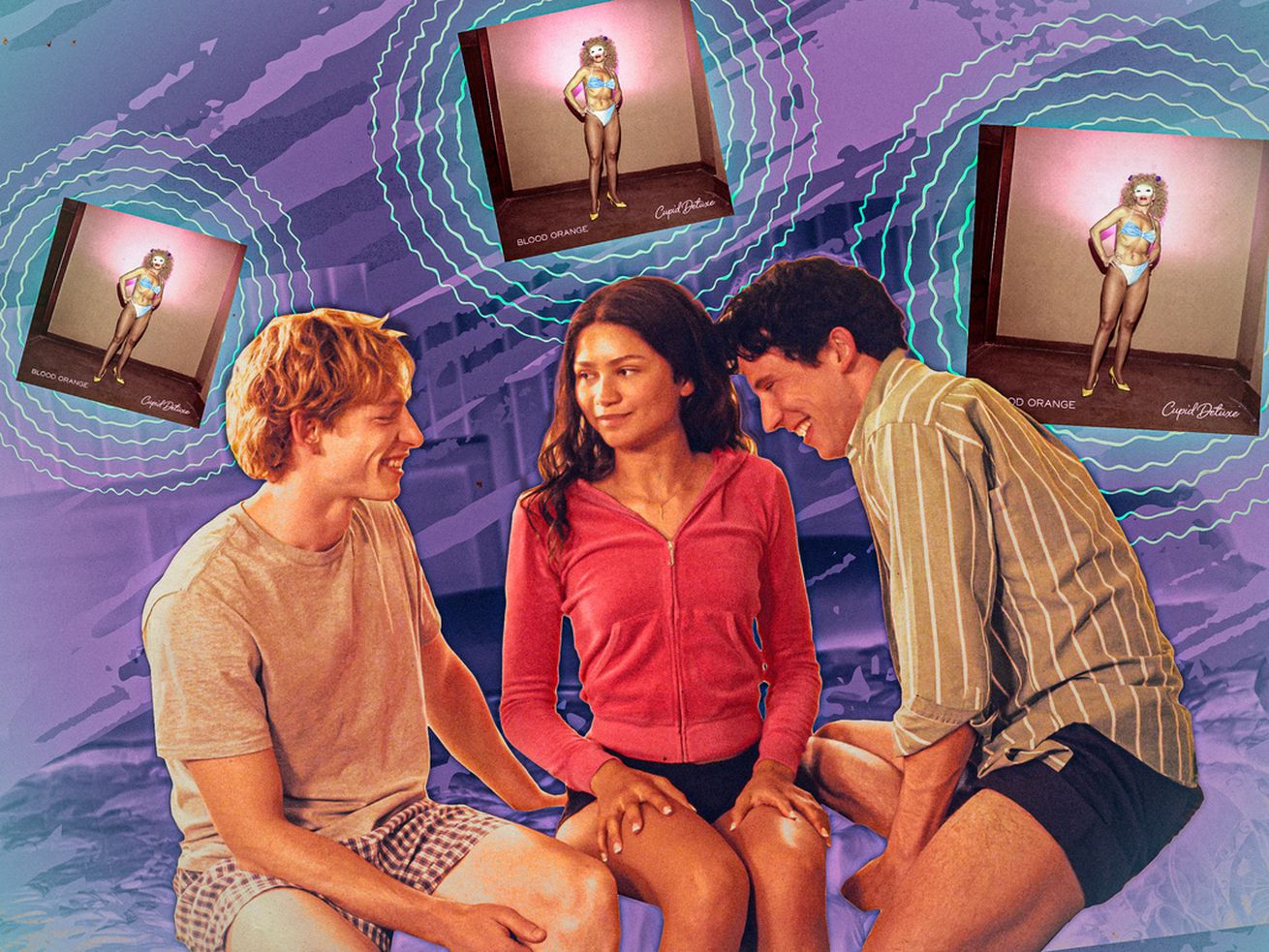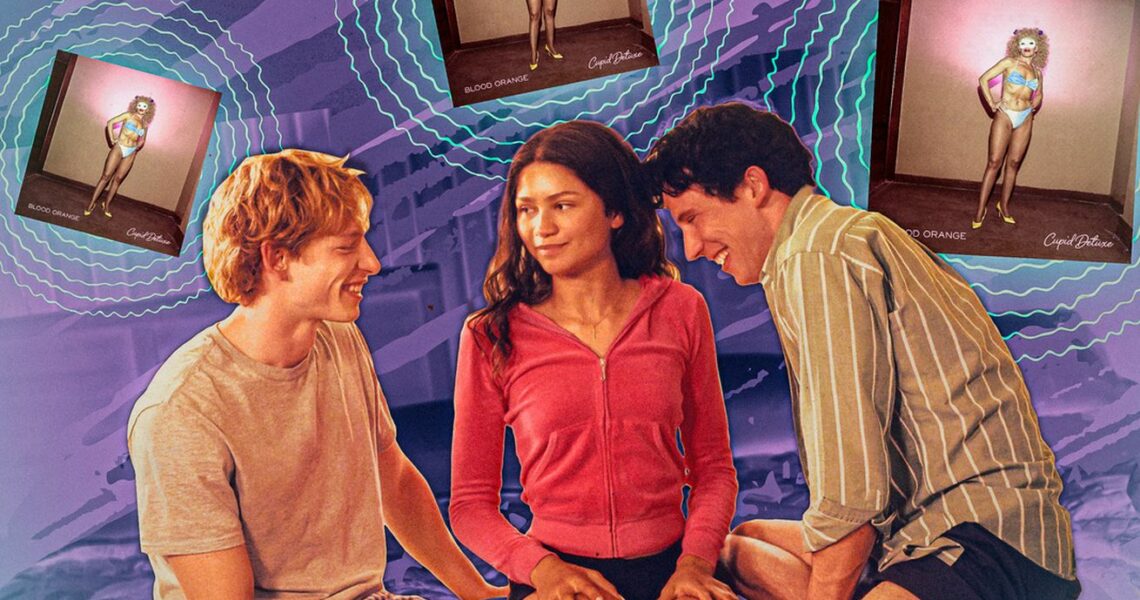
It’s one of the most talked-about scenes of the year. It also uses a wildly era-inappropriate song. What gives?
/cdn.vox-cdn.com/uploads/chorus_asset/file/19021663/spoiler_warning_v2.2.jpg)
Challengers is a movie obsessed with making sure you understand its chronology. Throughout its 131 minutes, Luca Guadagnino’s new ténnage à trois flick deploys a barrage of scene-resetting phrases like “THIRTEEN YEARS EARLIER,” “THE NEXT DAY,” and even “MIDNIGHT,” in all-caps, pink-text title cards. (Also: “SET BREAK,” shortly after a match official explains that they’re going to take a break between sets.) I’m not sure all of this is necessary: Even as the plot volleys across two decades, most shifts are easy to track. We know that it’s the mid-aughts because there’s a Motorola Razr on Zendaya’s nightstand; we know that it’s closer to the present day because Josh O’Connor is swiping through Tinder on a cracked iPhone. This isn’t exactly Lost Highway! (Though I would love to see what title cards Luca would’ve cooked up for Lynch’s neo-noir headfuck.)
This is, of course, a minor complaint—and I may be on an island here, considering the Letterboxd and Rotten Tomatoes love Challengers is getting. But it’s relevant to a question I’m about to ask: Does Luca think I’m an idiot and that I wouldn’t notice he snuck a song from the wrong decade into a scene set in (roughly) 2006?
I’m specifically referring to THE scene, as in [insert “SPOILER” and “CONTENT WARNING” title cards here] the infamous threesome set piece that threatens to, uh, thrust the acronym “MMF” into the mainstream lexicon. [Another title card here: “DON’T GOOGLE MMF AT WORK.”] If you have a passing familiarity with Challengers, then you know what I’m referring to—Zendaya, O’Connor, and Mike Faist on a hotel bed, both men fawning over her, things getting hot and heavy as the two men try to show her their stroke (before playing a little doubles with themselves). The movie’s been out for less than 24 hours and it’s already one of the most talked-about scenes of the year. All of my attention should’ve been on this triples match. However, I was too busy losing my mind over one small detail: the song playing on the radio during this scene. Blood Orange’s “Uncle ACE”—ace, get it?—from his breakthrough Cupid Deluxe. A song that came out in 2013—as in six or seven years after this illicit almost-affair took place.
Not them playing uncle ACE https://t.co/pJCBcnoepJ
— woah kenny (@kennybeets) April 24, 2024
To be clear, “Uncle ACE” is an excellent song off Dev Hynes’s excellent album, and maybe a perfect choice, vibes-wise. It’s sexy, it’s propulsive, and it, uh, climaxes with an unbelievable sax solo. It’s also vaguely nostalgic, which should work in a movie that taps into nostalgia. The problem is that this song is supposed to be diegetic—the film nerd word meaning it exists in the world of the film, which, well, “Uncle ACE” certainly did not. (In fact, not only does Challengers imagine a world in which this song existed in 2006, but it also imagines a world in which a radio station would be conducting a lengthy interview with Dev Hynes.) If you’re a music nerd on top of being a film nerd, this is the exact kind of thing that will take you out of an experience. Instead of focusing on the Y tu Tennis También shit unfolding before your eyes, you’re desperately trying to make sense of why some dork-ass tennis prodigies in 2006 would be listening to a deep cut off of Pitchfork’s 21st-best record of 2013. It is all-caps, pink-text MADDENING!
A few weeks ago, before I had seen Challengers, a colleague of mine referred to it as “Saltburn-core.” If you’ve seen both, the descriptor fits. Even if Challengers’ threesome scene or churro-nibbling can’t come close to Saltburn’s spunk-slurping, grave-humping chaos, there’s a certain memeable soapiness to both. Both films also share an affinity for overexplaining things—I will never forgive Saltburn for the climactic montage, which gave the Usual Suspects plot-twist treatment to things that no half-awake viewer could have ever missed. (What do you mean the bad-guy liar lied about bad things?) And maybe most importantly, both Challengers and Saltburn mine the same era for nostalgia—with apparently little care for the finer details. Infamously, in Saltburn—which is also largely set in 2006 and 2007—there are a number of issues: characters playing MGMT songs a year before they could’ve known about them, karaoke versions of yet-to-be released Flo Rida hits, the family watching Superbad on DVD before the movie was even released in theaters! I know the rich have access to many things us plebes don’t, but I’m pretty sure Judd Apatow wasn’t sending the Catton family rough cuts of McLovin and friends. And it wasn’t just music and film nerds that noticed this stuff: The Saltburn anachronisms were so egregious that blogging about them became something of a cottage industry around the holidays.
As time goes on, it’s only natural that more and more movies will start looking back on the late 2000s and early 2010s. But if I’m going to be repeatedly confronted with the notion that my best days are now fodder for nostalgia, can’t they at least nail the details? Why bother setting the story in a not-really-that-bygone era in the first place if not? And if that doesn’t matter, then are these films being placed in the mid-aughts in service of the story or because it’s easy to tap into cheap sentimentality? Why didn’t the music supervisor for either movie step in and say, “Hey, shouldn’t these kids be listening to, like, “Daft Punk Is Playing at My House” instead? (Though if I’m being real, Art Donaldson seems more like a Band of Horses guy.) It’s not like Luca and his team didn’t focus on other small details: The product placement is self-aware, but avoids veering into Talladega Nights or Wayne’s World parody territory. The specific degradations of Josh O’Connor’s character—and the way they manifest through his court attire and the empty bottles clinking around the floor of his car—are subtly brilliant. Hell, this is a movie with an intricate understanding of the geography of Westchester County! I have my gripes with a handful of things about the film—let’s never talk about the stop-motion wind kiss under the giant “Game Changer” poster—but it’s clear some level of care went into this. (Though there is one other pedantic, also diegetic thing I have to speak my truth on: At one point, Zendaya’s kid asks to watch Spider-Verse, and while I admire the restraint shown in not referencing the mononymous star’s own role in that franchise, the winking reference doesn’t break the fourth wall so much as it splits its skull against it.)
Mistakes—or possibly just wanton flouting of chronology—like the “Uncle ACE” placement are head-scratching, but ultimately inconsequential. No one, aside from the most P4K-pilled, is going to truly care about the flattening of indie-music history. (And to be fair, during one scene, Challengers got the mid-aughts hipster catnip right with a needle drop of Spoon’s “I Turn My Camera On.”) Also, I get it: There are a trillion small things that go into making a movie, so it’s better to have some grace, especially with the man who made Call Me by Your Name. But my culture—my skinny jeans and iPod Nano and Sailor Jerry tattoos—is not a costume, so please have some respect. If you’re going to ask me to care that much about the timeline, you have to care about every part of it. That shouldn’t be hard to grasp. Maybe if I put it on a title card in all caps, they’ll understand.

